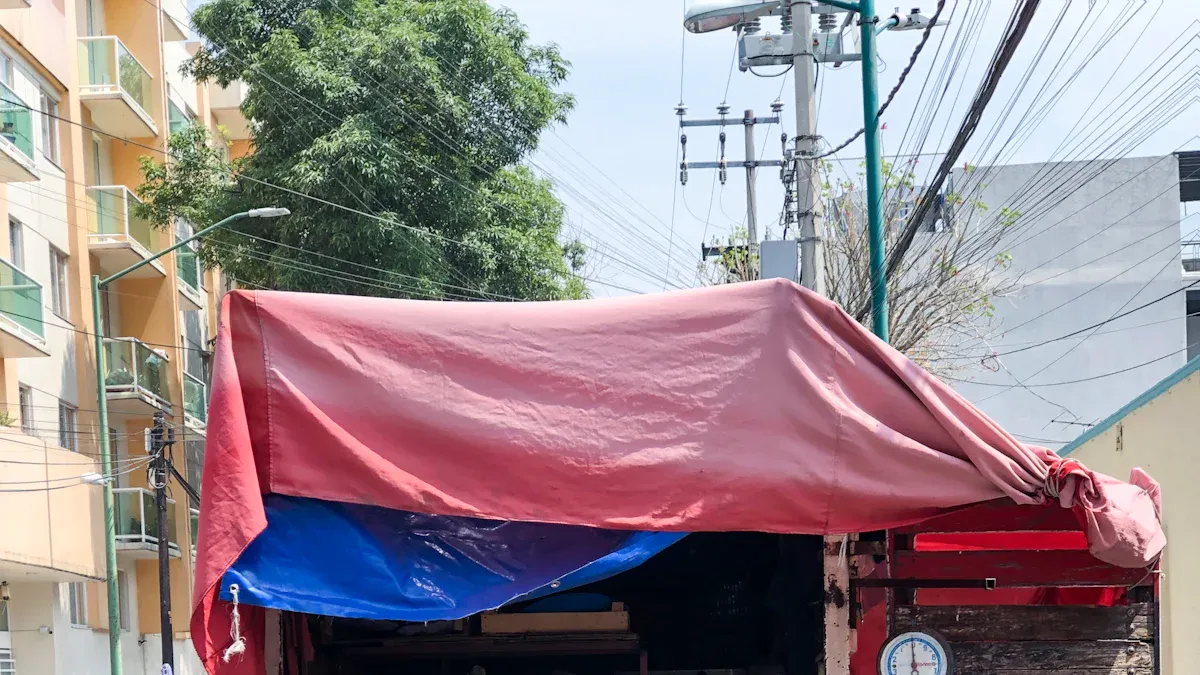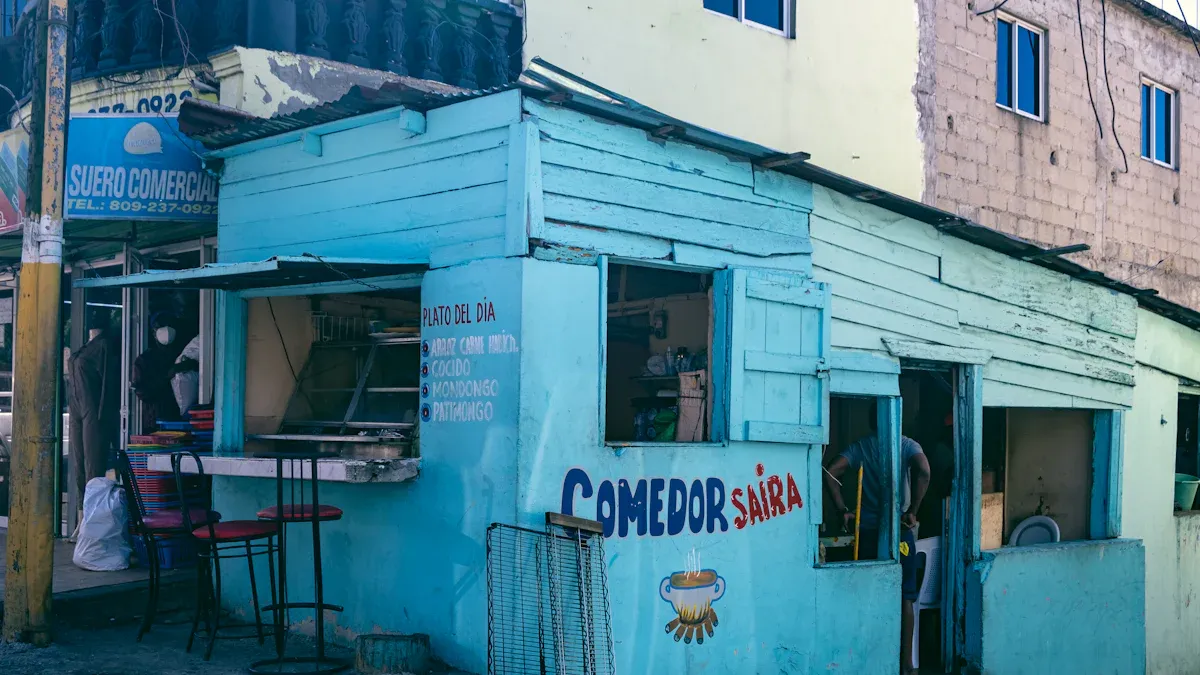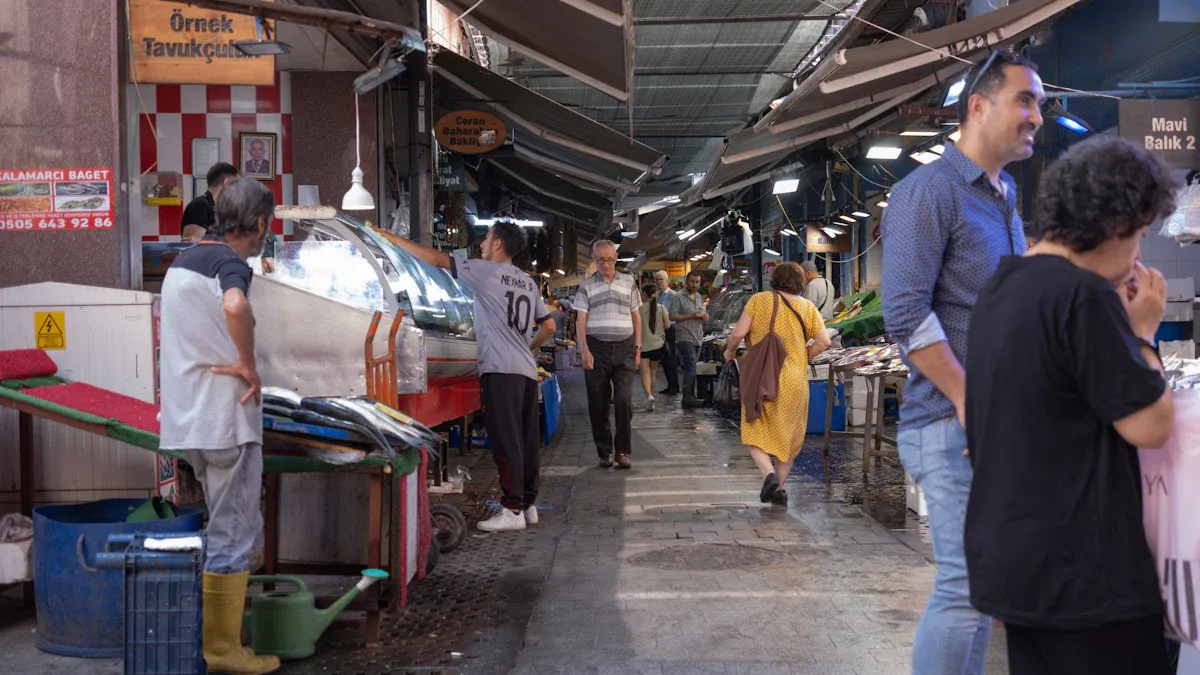The Social Hub of the Neighborhood: Exploring the Unique Culture of Dominican Corner Stores

Step into a local bodega in the heart of your neighborhood. You hear laughter, see neighbors chatting, and smell fresh empanadas. The social hub buzzes with energy as people greet each other, share news, and pick up essentials. In New York City, Dominican-owned bodegas make up a huge part of the small neighbourhood grocery store scene. Your neighborhood corner store doesn’t just sell groceries; it creates a space where you feel connected. Unlike other corner stores, Dominican bodegas treat you like family, offer help, and shape the social hub of the neighborhood.
In Washington Heights, 77% of corner stores are Dominican-owned, showing how these bodegas anchor the neighborhood.
Owners focus on community needs, making every visit to the social hub a unique experience.
Key Takeaways
Dominican bodegas serve as vital community hubs, offering more than groceries. They create a welcoming space where neighbors connect and share stories.
These corner stores adapt their offerings to reflect local culture, providing traditional foods and products that remind customers of home.
Bodega owners build strong relationships with customers, remembering their preferences and fostering a sense of belonging in the neighborhood.
As urban landscapes change, bodegas continue to evolve, promoting healthier food options and supporting local farms to meet community needs.
Shopping at your local bodega helps sustain its role as a cultural and social center, ensuring it remains a vital part of the community.
Origins of Dominican Bodegas

Immigration and Community Roots
You might wonder how Dominican bodegas became such a big part of your neighborhood. The story starts with Dominican families searching for new beginnings. In the early 1960s, the assassination of dictator Rafael Trujillo brought chaos to the Dominican Republic. Many people, including students, professors, and workers, left their homes and moved to cities like New York. The U.S. embassy helped by giving out visas. Later, more Dominicans arrived, especially women, hoping to escape tough economic times in Latin America.
When you walk into a bodega, you step into a place built by dreams and hard work. Dominican bodegueros didn’t just open stores—they created safe spaces for their community. These stores offered familiar foods like mangú and arroz con habichuelas. You could taste home, even if you were far away.
Dominican bodegas became more than shops. They turned into meeting spots where you could share stories and make friends.
By 1991, Dominicans owned about 80% of Latinx-owned bodegas in New York City. This shows how strong their roots grew.
Evolution of Corner Stores
The corner store you visit today looks different from the old colmados in the Dominican Republic. Back then, colmados were small shops where neighbors gathered, played dominoes, and talked about life. In New York, Dominican bodegueros changed the style to fit city life. They added new products, offered quick meals, and kept the friendly vibe. You see people chatting, sharing news, and building connections every day.
Modern bodegas mix tradition with city energy. You find snacks, groceries, and even advice from the owner.
These stores help you feel at home, no matter where you come from.
Daily Life in the Social Hub

Unique Offerings in Corner Stores
When you walk into a Dominican bodega, you notice right away that it feels different from other corner shops. The shelves show off a mix of everyday essentials and special items that remind you of home. You see plátanos stacked next to bags of rice, and you smell the aroma of fresh coffee brewing behind the counter. These corner stores offer more than just snacks and drinks. They bring you traditional Dominican dishes, like mangú and pastelitos, that you can't find in most other places.
You might come in for milk, but you leave with a warm empanada and a smile from the owner. That's the magic of these corner shops—they know what you like and make sure you feel welcome.
Dominican bodegas stand out because they carry products that reflect the community's culture. You find Goya beans, tropical juices, and spices that remind you of family meals. The store owners listen to what you need and adjust their shelves to match your tastes. This personal touch makes each bodega unique.
Here’s a look at how bodegas tailor their offerings to fit the neighborhood:
Evidence Description | Source |
|---|---|
Bodegas adjust their inventory based on local demographics, offering products that reflect the community's cultural background. | |
Each bodega's offerings are tailored to the specific cultural background of its owners and the neighborhood it serves. | |
Bodegas in the Bronx serve as essential food sources and community hubs, addressing local food insecurity and health needs. |
You see that these corner stores do more than sell food. They offer services like money transfers, phone cards, and even help with finding local jobs. The bodega becomes a lifeline for many families.
Everyday Interactions
You notice that Dominican corner shops are always busy. People stop by not just to shop, but to catch up with friends and neighbors. The owner greets you by name and asks about your family. You hear laughter and stories shared over the counter. The bodega acts as an informal gathering spot, where news travels fast and everyone feels included.
You see flyers for community events taped to the door.
People ask for advice or share local updates.
Kids buy candy while parents chat about school.
The bodega is more than a store. It’s a message board, a meeting place, and sometimes even a support center. You feel safe and connected every time you visit. The owner knows your favorite snack and remembers your birthday. These small gestures build trust and make the corner shop a true social hub.
Next time you step into a Dominican bodega, take a moment to notice the warmth and energy. You’re not just a customer—you’re part of the neighborhood family.
Community Connections in Bodegas
Building Social Networks
You walk into a bodega and feel the buzz of the neighbourhood. People greet you, ask about your day, and share stories. The bodega owner knows your favorite sandwich and remembers your family. This is where friendships grow and news spreads. You see neighbors helping each other and offering support. The bodega acts as a bridge between different groups, including the puerto rican community and the dominican-american community.
"When you go to a bodega, they greet you, ask how are you doing, how is your family doing. I already know how my customers like their coffee and their sandwiches. There is a very close integration with people," said Rodriguez, who founded the United Bodegas of America (UBA).
You hear about local events, job openings, and even rumors. The bodega becomes a social network, connecting everyone in the neighbourhood. You notice flyers for community engagement and see small businesses working together. The owner gives you confidence and makes you feel welcome.
"Bodegas became the social hub, the social network. Anything that was happening, you could find out in the bodega, even the bad rumours," said documentary filmmaker Lilian Jiménez.
You realize that dominican-owned enterprises like bodegas help build strong ties. They offer support when you need it most. You see how these small businesses shape the unique culture of your neighbourhood.
Preserving Culture and Traditions
You step inside and see signs of heritage everywhere. The bodega displays flags, family photos, and traditional foods. You hear Spanish and English mixed together. The owner shares stories about the old days and teaches you about Dominican and puerto rican culture. You taste dishes that remind you of home and learn about customs from both communities.
"What I like most about being a bodeguera (bodega owner) is giving people that confidence. It pleases me to know that I serve them well," said Melo, who has owned El Vacilón for 20 years.
You notice that small businesses like bodegas keep traditions alive. They celebrate holidays, play music, and support local artists. You join in and feel proud of your neighbourhood. The bodega stands as a true NYC institution, protecting the heritage of the dominican-american community and the puerto rican community. You see how community engagement helps everyone feel connected.
You leave knowing that your bodega is more than a store. It is a place where culture, support, and engagement come together. You feel part of something special.
New York City Bodegas: Challenges and Change
Adapting to Urban Shifts
You see changes happening all around your neighborhood. New buildings go up, and different people move in. Dominican bodegas have learned to adjust quickly. In places like Washington Heights, the Dominican community keeps growing. You notice more Dominican-owned businesses on every block. Between 157th and 191st Streets, you can count about 12 Dominican shops per block. This shows how much the community shapes the area and keeps new york corner stores busy.
Bodega owners face new rules and health trends. You might spot employees attending workshops about city regulations and food safety. They learn how to keep food fresh and safe for you. Some owners join programs that teach them to offer healthier choices. You find more fruits, veggies, and low-calorie snacks on the shelves. These changes help bodegas stay important in a changing city.
Staff learn about city rules and food safety.
Owners promote healthier foods to customers.
Programs like Healthy Neighborhoods help bodegas switch to better options.
The Future of Corner Stores
You wonder what’s next for your favorite bodega. Experts say new york city bodegas will become even more important. They will help fight food insecurity and support health in your community. Evelyn Brito says bodegas are places where people connect and share their lives. You might see more fresh foods and eco-friendly products in the future. Projects like Bodega Makeover want to link local farms with bodegas, making food systems more sustainable.
Bodegas will act as community centers.
Owners will offer healthier foods and support local farms.
Working with neighbors and organizations will help bodegas improve food access.
You play a part in this change. When you shop at your local bodega, you help shape its future. You see how nyc keeps changing, but bodegas stay strong by adapting and caring for the community.
You see Dominican bodegas as more than stores—they anchor your neighborhood and keep traditions alive.
These bodegas evolved from colmados, changed hands as communities shifted, and stayed open during tough times like the pandemic.
Their vibrant atmosphere and strong community ties set them apart from other corner shops.
Bodegas outnumber supermarkets in places like the Bronx.
Most New Yorkers visit bodegas every week.
They remain a trusted part of daily life.
Looking ahead, you help shape the future of these corner stores every time you walk through the door.
FAQ
What makes a Dominican bodega different from other corner stores?
You find Dominican bodegas offer foods and products from the Dominican Republic. Owners greet you like family. You see neighbors chatting and sharing news. The store feels warm and welcoming.
Can I buy traditional Dominican food at a bodega?
Yes! You can grab mangú, pastelitos, empanadas, and fresh coffee. Many bodegas cook these foods daily. You taste flavors from home right in your neighborhood.
How do bodegas help the community?
Bodegas support you by sharing local news, offering jobs, and helping families. You see flyers for events and get advice from the owner. The store connects everyone.
Are bodegas only found in New York City?
You spot Dominican bodegas in New York City most often, especially in Washington Heights and the Bronx. You also find them in other cities with Dominican communities, like Boston and Miami.
See Also
Unveiling The Elegant Allure Of The Corner Shop
Discovering Pepe's Corner Shop: A Fusion Of Groceries And Local Tastes In Dallas
Investigating Corner Store: A Distinctive Mix Of Groceries And Local Delights In Dallas
Finding The Top Corner Shops Just A Short Walk Away
Uncovering The Neighborhood Appeal Of O & A Corner Store In Buffalo, NY
